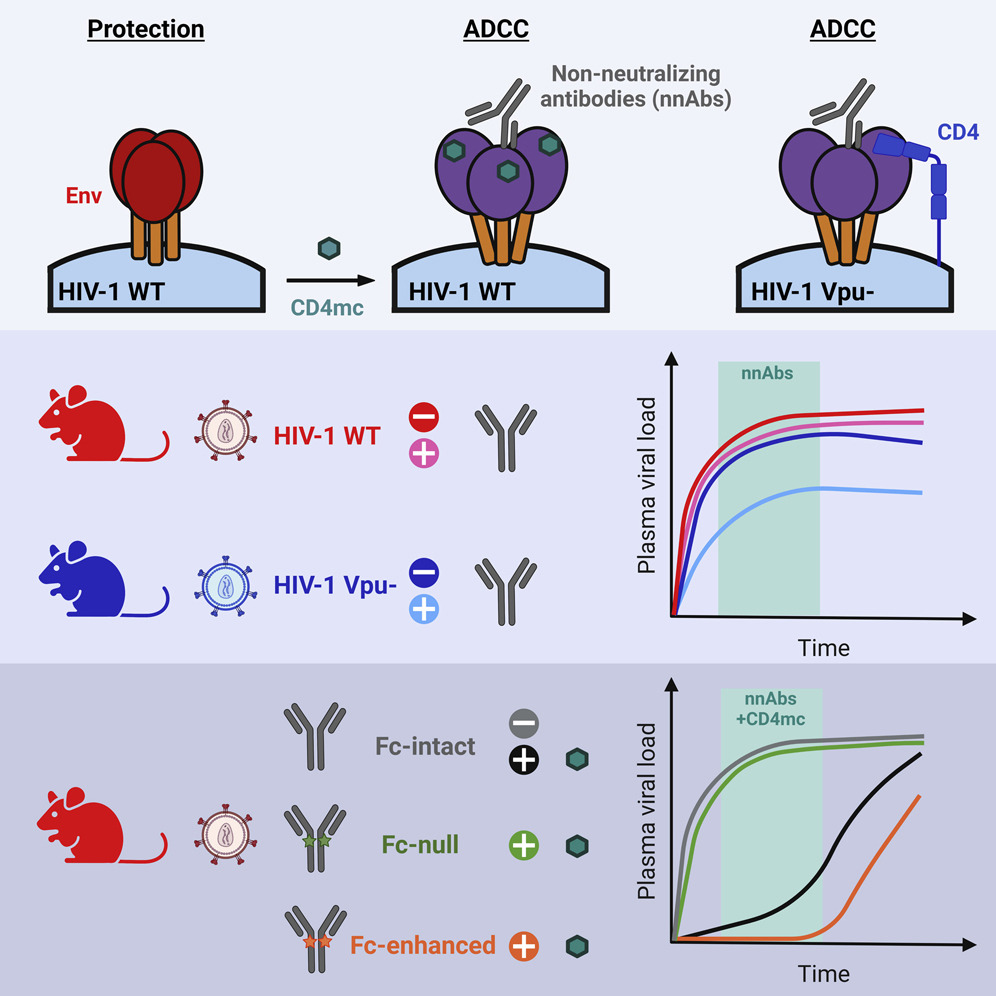Medtech
HIV’s Vpu Protein Makes It Harder for Antibodies to Recognize Infected Cells
The expression of the HIV protein Vpu is essential for infected cells to evade the elimination mechanism known as antibody-dependent cell-mediated cytotoxicity…

Multiple types of antibodies (Abs) play various roles during an HIV infection. Broadly neutralizing antibodies (bNAbs) may recognize a conformation of the envelope protein—the main target for humoral responses as the sole viral antigen exposed at the surface of virions and infected cells—but they are difficult to elicit in vivo. Non-neutralizing antibodies (nnAbs), which represent the majority of Abs in the plasma of HIV-1-infected individuals and are easily elicited by vaccination, have been thought of as a potential alternative. In addition, nnAbs have been shown to eliminate HIV-1-infected cells via antibody-dependent cellular cytotoxicity (ADCC) and were identified as a correlate of protection in a vaccine trial.
A vpu-defective virus has been used to show that Fc-mediated effector functions of nnAbs alter the course of HIV-1 infection in vivo. Now, a new study hypothesized whether a lack of Vpu expression was linked to the observed nnAbs activity. They based this on the understanding that Vpu is known to downregulate cell-surface CD4, which triggers conformational changes in the envelope glycoprotein.
The study shows for the first time in humanized mice that the expression of the viral protein Vpu is essential in allowing infected cells to evade the elimination mechanism known as ADCC.
This work is published in Cell Reports in the study, “HIV-1 Vpu restricts Fc-mediated effector functions in vivo.”
“We observed that the modified HIV-1 virus used in certain laboratory experiments does not express Vpu,” said Andrés Finzi, PhD, Université de Montréal professor and researcher at the CHUM Research Centre. “However, in the naturally occurring virus, this protein actually plays the role of a bodyguard for the infected cell. Once expressed, it allows it to replicate itself and helps it protect itself by flying under the immune system’s radar.”
In fact, the study shows that by expressing the Vpu protein in infected cells, non-neutralizing antibodies have a much more difficult time recognizing these cells in vivo.
Experiments in humanized mice that received non-neutralizing antibodies confirmed this observation. Only animals infected by a virus in which Vpu was not expressed saw their viral load drop, in contrast with those infected by a naturally occurring virus.
More specifically, they found that restoring Vpu expression greatly reduces nnAb recognition of infected cells, rendering them resistant to ADCC. Moreover, they wrote, “Administration of nnAbs in humanized mice reduces viral loads only in animals infected with a vpu-defective but not with a wild-type virus. CD4-mimetics administration, known to ‘open’ Env and expose nnAb epitopes, renders wild-type viruses sensitive to nnAbs Fc-effector functions.”
In 2013, Finzi’s team had already shown that infected cells are protected from the ADCC response because the viral envelope remains closed under the effect of Vpu and the protein Nef, a second bodyguard. Fully sheltered, the infected cell cannot be found by antibodies in the vicinity.
“In the laboratory, if Vpu is not expressed in the virus that you use, the envelope of the infected cell will open up,” said Finzi. “Without protection, it will be attacked by antibodies. This likely explains some surprising results reported with non-neutralizing antibodies. In real life, HIV is always on guard thanks to its two bodyguards, Vpu and Nef.”
The researchers believe that this work, which highlights the importance of Vpu-mediated evasion of humoral responses, should be taken into consideration in the development of future vaccines against HIV-1 and in strategies for eradicating the virus.
According to the World Health Organization, at the end of 2021 more than 38 million people were living with the virus that causes AIDS.

The post HIV’s Vpu Protein Makes It Harder for Antibodies to Recognize Infected Cells appeared first on GEN – Genetic Engineering and Biotechnology News.

ETF Talk: AI is ‘Big Generator’
Second nature comes alive Even if you close your eyes We exist through this strange device — Yes, “Big Generator” Artificial intelligence (AI) has…
Apple gets an appeals court win for its Apple Watch
Apple has at least a couple more weeks before it has to worry about another sales ban.
Federal court blocks ban on Apple Watches after Apple appeal
A federal appeals court has temporarily blocked a sweeping import ban on Apple’s latest smartwatches while the patent dispute winds its way through…














